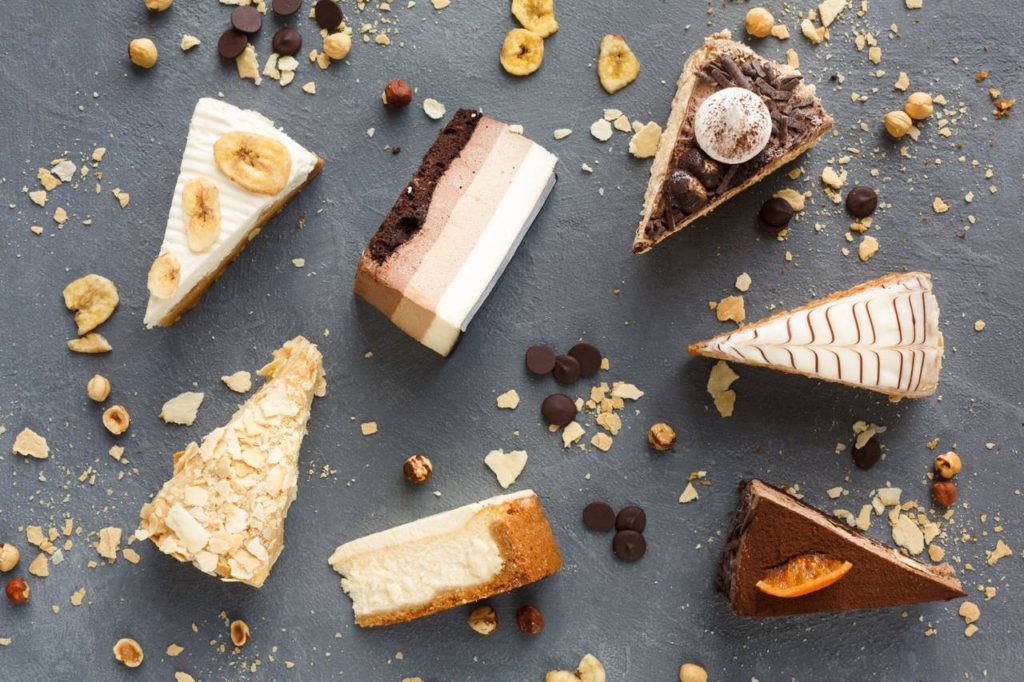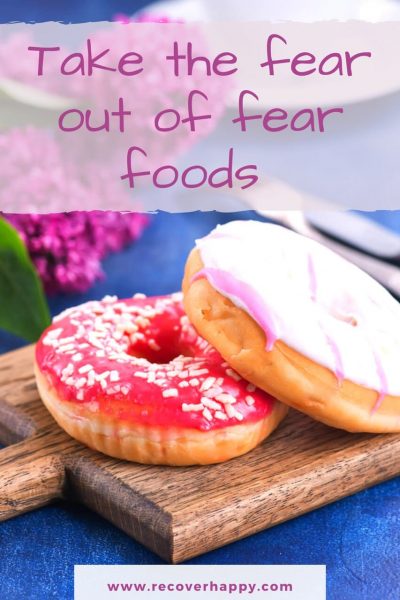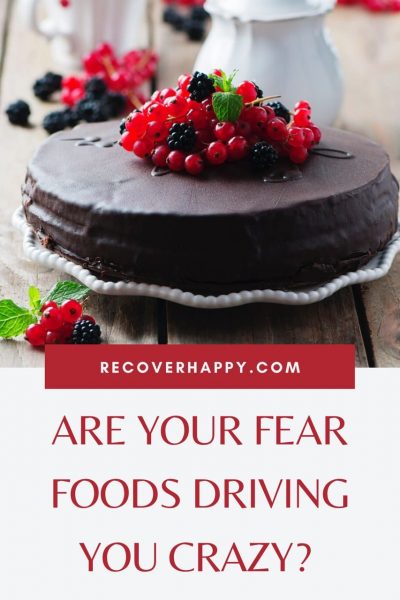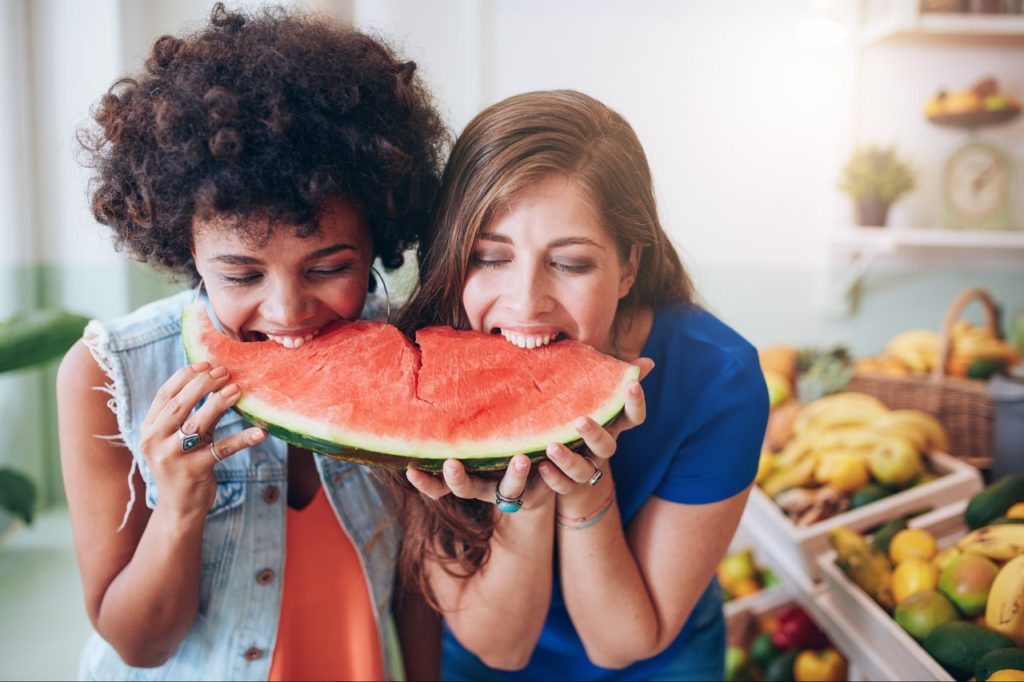Are your fear foods driving you crazy?
By Tanja, Psychologist for Eating Disorders & Body Image

Whose mouth doesn’t water at the sight of cakes in a bakery or ice cream in a traditional Italian ice cream shop? Mine does.

Hi there!
I’m Tanja. I’m a qualified psychologist specialising in eating disorders, negative body image and body hate. I’m also a survivor of anorexia.
My mission is to help you to end your lifelong struggles with food and your body and inspire you to uncover and embrace you true worth. Read more…
Just a few years ago it would have been impossible for me to eat even a single bite of a cake or ice cream. Because both were at the top of my list of fear foods and drinks. Just the sight of a cake or an ice cream caused me to panic and led to mental images of uncontrolled weight gain. I would feel my chest tighten and my heart rate quicken. Even to this day, I can remember those feelings of dread.
Having fear foods and labelling food as “good” or “bad” is pretty common for people who are suffering from anorexia, orthorexia, binge eating disorder or body image issues. If you experience the same and have labelled some foods as “safe” and other foods as “unsafe”, I can tell you that there is a way out.
Now you might ask yourself what enabled me to stop worrying about my fear foods.
The quick answer is intuitive and mindful eating. Step by step, I learned to listen and respond to the hunger and fullness signals of my body again. Through this, I regained trust in my body. This new trust and the understanding that eating my fear foods didn’t make me “fat” allowed me to increase gradually my choice of food.
If you want to know more about intuitive eating while recovering from an eating disorder, read my blog articles The 10 principles of intuitive eating in eating disorder recovery and The power of intuitive eating in eating disorder recovery.
I know this sounds quite easy, but it isn’t. Challenging your fear foods and including them in your meals is hard work, but well worth it. Let me show you how to get over your fear foods once and for all.
Join the Body Acceptance & Food Freedom Collective
Receive a weekly dose of inspirations to help you make peace with your body and food.
Don’t worry, we hate spam too. You can unsubscribe any time.
Categories
Anorexia
Binge Eating Disorder
Bulimia
Intuitive Eating
Mindfulness
Orthorexia
Strategies for Recovery
What are fear foods?
As the name suggests, fear foods are foods that someone is afraid of, anxious about or uncomfortable eating. Fear foods can be just one type of food, such as ice cream or pizza, or an entire food group such as fats or carbohydrates. The fear of certain foods or food groups is rooted in the belief that if they are eaten, they will lead to immediate weight gain or the loss of self-control. This leads to fear foods being restricted or avoided entirely.
When people with eating disorders or body image issues eat a fear food, they may feel guilty, ashamed, or even disgusted.

Why does a fear of foods develop?
There are various reasons why a fear of foods might develop, such as:
- Comments about food by family and friends;
- Negative personal experiences with food;
- Health campaigns that provide information about nutrients;
- Culture and media messages about food and diets.
From an early age, we learn to look at ingredient lists and nutritional labels. We are conditioned to eat at certain times and taught that certain foods are good for our health and others are bad. All this information and well-meant lifestyle advice from our family, friends and the media influence our eating habits and can contribute to a fear of foods. Being surrounded by people who are dieting and messages promoting weight loss can have a particularly negative impact.
At the start, I reduced my calorie intake simply by eating less, but I soon moved on to restricting myself by not eating any sugar-containing foods and drinks. The next step was to cut out carbs completely. Avoiding these foods gradually led me to develop a fear of all sugar and carb-containing foods, which became more intense during my eating disorder.
The problem with fear foods
Having fear foods is problematic because you miss out on a variety of essential nutrients that you only can get by eating a wide range of foods. You might also become more isolated from family members and friends, as socialising often revolves around eating. You may experience constant thoughts about fear foods and how to avoid them, which worsens your relationship with food – food ends up becoming the enemy. Repeatedly denying your fear foods can increase your preoccupation with and desire for it, which can lead to binge eating.

How to get over your fear foods
Let’s look at some ways to challenge your anxiety about fear foods.
1. What are your fear foods?
The first step in overcoming your fear foods is to identify them. To do this, create a list that is divided into three sections: Foods of which you are a little, moderately, and extremely scared. Sometimes people are scared of certain foods or food groups for so long that they are unaware how much they have restricted their choice of foods.
If you are having trouble completing your list of fear foods, go to a supermarket, walk around and imagine yourself eating the foods on the shelves. If you feel any fear or worries about eating a certain food, write it on your list. Then note the level of your fear on a scale of 0 to 10 (0=no fear and 10=extreme fear). If you come across a food that you don’t like the taste of, ask yourself if this is really true, as sometimes people convince themselves that they don’t like the taste of a particular food that they are actually afraid of. Once you have identified your fear foods, ask yourself these two questions in relation to each of these foods and write down the answers:
- What are the reasons to be scared of this food?
- Is it helpful to continue avoiding this food?
For any reason you find to be scared of a food, think of at least two reasons why you should enjoy this food.
2. Experiment with your fear foods
Fear of certain foods or food groups is mainly based on beliefs and predictions of what might happen, not facts. To gain a better understanding of your fear foods and help you overcome them, it may be helpful to test your predictions about them.
To test your predictions, follow the steps below:
- Pick a food from the “Foods you are a little scared of” section of your list. Start withthe food that has the lowest fear rating.
- Ask yourself the following questions: What am I afraid will happen if I eat this food? How will I test this prediction? When will I test this prediction? Where will I test it?
- The next stage is to eat some of the fear food you have picked. Write down the level of stress before, during and after eating it, on a 0 to 10 scale (0=no stress, 10=extreme stress).
- Now ask yourself these two questions: What actually happened when I tested my prediction? What does this mean for my view of this fear food?
Don’t push yourself too hard; break this process down into manageable steps. Start with foods that you are only a little bit afraid of and work your way up to foods that are extremely scary to you. If a certain food causes a lot of anxiety, take it slowly and start with a small amount; for example, instead of a bowl of ice cream, you could eat just a teaspoon and gradually work your way up to larger portions .
Once you have mastered this, you can move on to another food on your list.
You don’t need to struggle alone on your recovery journey.
Simply get in touch to discuss how I can help you.
It is entirely possible to overcome an eating disorder or body hate –
I have done it, others have done it and so can you!
Join the Body Acceptance & Food Freedom Collective
Receive a weekly dose of inspirations to help you make peace with your body and food.
Don’t worry, we hate spam too. You can unsubscribe any time.
You Might Also Enjoy...

Hi there!
I’m Tanja. I’m a qualified psychologist specialising in eating disorders, negative body image and body hate. I’m also a survivor of anorexia.
My mission is to help you to end your lifelong struggles with food and your body and inspire you to uncover and embrace you true worth. Read more…



